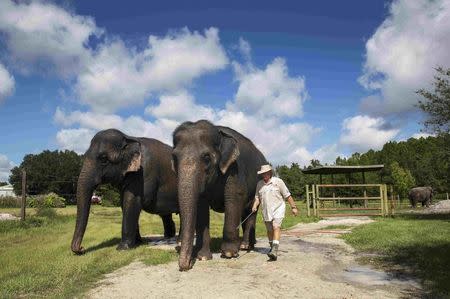Ringling Bros circus to cease elephant acts in May
By Colleen Jenkins (Reuters) - The elephant acts that have been part of Ringling Bros and Barnum & Bailey Circus shows for more than a century will end in May, earlier than their previously announced retirement, the circus' parent company said on Monday. Last March, Feld Entertainment said the 13 Asian elephants used in its traveling shows would be phased out by 2018. The company accelerated the retirement plan after concluding its 200-acre Center for Elephant Conservation in central Florida had enough barn space, water and waste disposal capacity to hold the 11 elephants still on tour, spokesman Stephen Payne said. The circus has been targeted by animal welfare groups who accused it of mistreating the elephants, a key symbol of the spectacle billed as "The Greatest Show on Earth." Many local governments also have added regulations making it harder for the circus to tour with the animals. Calls by activists for the animals to be phased out more quickly did not factor into the company's decision, Payne said. "Absolutely not," he said. "We were able to accommodate the remaining 11 elephants sooner than we anticipated." The company said it is committed to saving the endangered species through breeding and medical research. Fewer than 40,000 Asian elephants remain in the wild. About 250 are in captivity in the United States, 26 of which were born in the past 20 years at Ringling facilities. The Ringling herd at the conservation center in Polk City, Florida, will total 42 once the traveling elephant shows cease. Blood samples from the elephants are being used for pediatric cancer research. Animal welfare groups said concerns persist over the company's breeding program and use of elephants for research. "Because the circus has refused to retire these elephants to an accredited sanctuary, vigilance will be needed to determine how they are treated," Ingrid Newkirk, president of People for the Ethical Treatment of Animals, said in a statement. PETA is pressing Ringling Bros to end all animal acts, but the company still plans to showcase tigers, lions, horses, dogs and camels. Payne said circus producers are adding new elements to shows that will debut this summer without the circus' largest performers. "We will all miss the elephants," he said. "We don’t have many 9,000-pound clowns." (Reporting by Colleen Jenkins in Winston-Salem, N.C.; Editing by Bill Trott and Phil Berlowitz)




